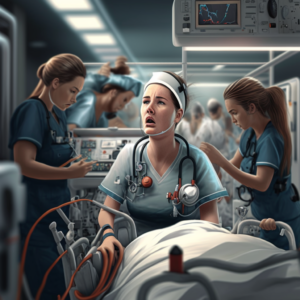Critical care nursing is one of the most demanding and challenging areas of nursing practice. It involves providing specialized care to patients who are critically ill or injured and require intensive monitoring and treatment. Critical care nurses work in a variety of settings, including emergency departments, intensive care units, and trauma centers. In this blog post, we will focus on the critical care nursing provided in the emergency department.
 Critical care nursing in the emergency department involves managing patients with life-threatening conditions such as heart attacks, strokes, respiratory distress, severe trauma, and sepsis. The critical care nurse in the emergency department plays a crucial role in the rapid assessment, stabilization, and treatment of patients in critical conditions. Their expertise in patient assessment, clinical decision making, and critical thinking is essential for the provision of optimal patient care.
 The first step in providing critical care in the emergency department is to assess the patient’s condition and prioritize their care. Critical care nurses must have the knowledge and skills to perform rapid and accurate assessments, including taking vital signs, performing physical exams, and obtaining patient histories. They also use a triage system to prioritize patients based on the severity of their condition, ensuring that those in the greatest need of care are seen first.
Once a patient has been assessed and triaged, the critical care nurse must work quickly to stabilize them and initiate treatment. This may involve administering medications, performing interventions such as intubation or chest tube placement, or starting IV fluids. The critical care nurse must also continually monitor the patient’s vital signs and adjust treatments as needed to maintain stability.
Critical care nursing in the emergency department requires a high level of collaboration and communication with other healthcare professionals. The critical care nurse must work closely with physicians, respiratory therapists, radiology technicians, and other members of the healthcare team to ensure that the patient receives optimal care. Communication is critical, and the critical care nurse must be skilled in relaying information accurately and effectively.
Critical care nurses also play an essential role in educating patients and their families about their condition, treatment options, and expected outcomes. They provide emotional support and guidance to patients and families during stressful and challenging times, helping them to understand and cope with the complex medical issues they are facing.
 Critical care nursing in the emergency department is a challenging yet rewarding area of nursing practice. It requires specialized knowledge, skills, and expertise to provide optimal care to patients in critical conditions. Critical care nurses in the emergency department are essential members of the healthcare team and play a crucial role in saving lives and promoting positive outcomes for patients and their families.

